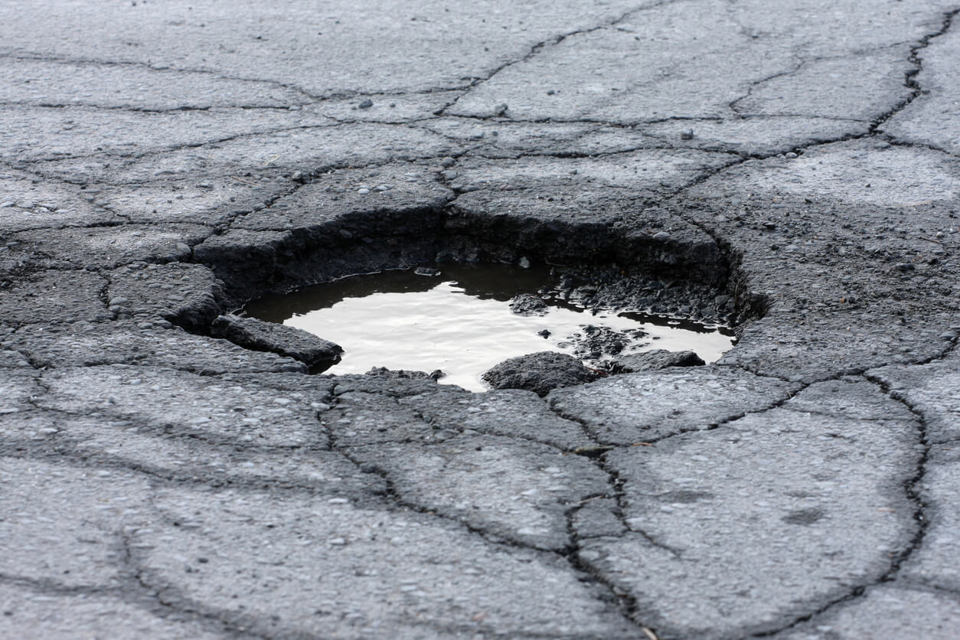A £50 million pothole fund announced in the budget ‘will fail’ to halt the decline of the local road network in England and Wales, new research suggests.
The Annual Local Authority Road Maintenance (ALARM) Survey, published last week, claims underfunding, severe weather and increased traffic is taking its toll on local roads.
It estimates the one-time cost to get roads in England and Wales back into a reasonable condition is now £11.8 billion.
“Our roads are deteriorating at a faster rate than they can be repaired,” said Alan Mackenzie, chairman of the Asphalt Industry Alliance.
“The network is ageing and the cumulative effect of decades of underfunding is continuing to take its toll. Add in the impacts of flooding and increased traffic and you start to appreciate the scale of the problem our local authorities are facing.”
The Government has set aside £6bn to fund local road maintenance between 2015 and 2021, and claimed the additional £50m announced in the budget would enable councils to fill nearly a million potholes.
However, the Asphalt Industry Alliance, which commissioned the ALARM survey, told Fleet News that overall budgets for highways departments in England have dropped by 16%.
This, it says, is reflected in the increase in average budget shortfalls – the difference between the money highways teams need to keep the carriageway in reasonable order and the amount they actually receive – which has risen by almost 50% (from £3.2m to £4.6m, year-on-year).
Peter Box, transport spokesman at the Local Government Association, said the shortfall in funding was leaving councils “trapped in a frustrating cycle” which results in them only being able to “patch up” deteriorating roads.
He added: “Councils share the frustration of motorists having to pay to drive on roads that are often inadequate.”
Across the country, Kwik Fit says that 6.3m drivers suffered damage from hitting potholes in their car or van over the past year, with repairs to tyres, wheels, suspension, exhausts or other bodywork costing an average of £108.60.
It estimates that they collectively faced costs of £684m as a result of the damage, but the ALARM survey reveals only £13.5m has been paid out in compensation in England and Wales, just 2.1% of the total cost of damage.
Kwik Fit found that, collectively, the greatest financial impact has been on drivers in the south east, who have had to pay more than £108m for repairs caused by potholes, followed by drivers in London, with the capital’s roads causing £91m worth of damage.
Hitting a pothole is most likely to have caused damage in Yorkshire and Humber, and London, where more than a third (37% and 35% respectively) of drivers hitting a pothole had to make repairs. Welsh drivers were most likely to be financially unscathed from the impact of a pothole, although even here 17% faced repair bills.
The past year saw the wettest November-January period on record, with surface water a significant factor in many drivers hitting potholes.
Almost a third (31%) of drivers who hit a pothole in the past 12 months say they did so because it was hidden by water and they thought it was just a puddle.
Kwik Fit found that nearly half (46%) of those hitting a pothole said they would have risked colliding with other traffic if they had swerved around it, while 4% admitted that they were driving too fast, and couldn’t stop in time.
RAC chief engineer David Bizley said: “It’s time for the Government to recognise that local roads are a vital part of the transport infrastructure which should be brought into the scope of the Infrastructure Commission.
“While the Government’s Road Investment Strategy is ensuring the future ‘fitness-for-purpose’ of the strategic road network in England, there is a very real danger that local roads will suffer ongoing decline through insufficient investment and no long-term strategy to improve them.
“What use would it be having excellent motorways, major roads, railways, ports and airports if, when getting to or from them, you are faced with pothole-ridden local roads.”




















Login to comment
Comments
No comments have been made yet.